From Bad Grades to a Great Life!
Unlocking the Mystery of Achievement for Your Child
Dr. Charles Fay
From Bad Grades to a Great Life!
Unlocking the Mystery of Achievement for Your Child
Dr. Charles Fay

2011 by Charles Fay, Ph.D.
All rights reserved. This book is copyrighted and reproduction in any form for any reason is prohibited by Federal Copyright Law. This includes but is not limited to copying for classroom or other educational use by teachers and other educators. Copyright laws pertain whether materials are used by for-profit or not-for-profit organizations and whether or not monies are exchanged for the materials.
United States copyright law will be enforced to its fullest extent against unauthorized copiers of these materials. Thank you for respecting the copyright laws.
Love and Logic Institute, Inc.
2207 Jackson St
Golden, CO 80401
www.loveandlogic.com
800-338-4065
Love and Logic, Love & Logic, Becoming a Love and Logic Parent, Americas Parenting Experts, Love and Logic Magic, 9 Essential Skills for the Love and Logic Classroom, Parenting with Love and Logic, Love and Logic Early Childhood Parenting Made Fun!, Early Childhood Parenting Made Fun! and  are registered trademarks or trademarks of the Institute For Professional Development, Ltd. and may not be used without written permission expressly granted from the Institute For Professional Development, Ltd.
are registered trademarks or trademarks of the Institute For Professional Development, Ltd. and may not be used without written permission expressly granted from the Institute For Professional Development, Ltd.
ISBN# 978-1-935326-08-3
Library of Congress Cataloging-in-Publication Data
Fay, Charles, 1964
From bad grades to a great life! unlocking the mystery of achievement for your child/
Dr. Charles Fay.
p. cm.
ISBN 978-1-935326-08-3
1. EducationParent participation. 2. Academic achievement. 3. Child rearing. I. Title.
LB1048.5.F39 2011
649.1--dc23
2011024592
Cover & Book Design: Michael Snell, Shade of the Cottonwood, L.L.C., Lawrence, KS Project Coordinator: Kelly Borden
 Published and printed in the United States of America
Published and printed in the United States of America
Contents
Your Underachiever Can Have a Great Life!
Whats more important? Getting great grades or becoming a great person?
Dont make the mistake of focusing on their weaknesses, instead.
If they are, theyve got a head start on a great life!
Sowhy are we all so obsessed with homework?
Kids are more likely to work when they have something to work toward.
A dull home makes school more exciting.
Allow them to believe this by allowing them to struggle.
Kids who have a purpose in life are far more likely to find a purpose in school.
Children who are loved for who they are experience the freedom to become the best that they can be.
ACKNOWLEDGMENTS
To my Lord and Savior Jesus Christ: You have comforted and strengthened me through my darkest days. You have given me a wonderful wife and children. You have guided me, nurtured me, loved me, and disciplined me. You have healed my weakened body of cancer and given happiness and hope for eternity. I pray that I may bless others as your ever present love has blessed me.
To my wife, Monica: You are beautiful inside and out! Thank you for your patience, your love, and your wonderful example.
To my parents, Jim and Shirley Fay: Thank you for loving me and always seeing the very best in me. You have always encouraged me to follow my gifts, and I thank God for you every day.
INTRODUCTION
Your Underachiever Can Have a Great Life!
Your underachiever really can have a great life! Why am I so sure? Two reasons: The first has to do with my professional experience over the past twenty-some yearsmy observations of countless academically apathetic kids whove grown to become respectful, responsible, and successful adults. The second has to do with my personal experience. As a child I was a legendary underachiever. The only motivation I had in the classroom involved trying to figure out how to avoid doing my work by making countless treks to the pencil sharpener, threatening that Id wet my pants if I didnt receive yet another bathroom break, or getting sent to the principals office for getting on my teachers last nerve.
Now the cats out of the proverbial bag. How ironic! Youre reading a book about motivating kidswritten by an underachiever.
To set the record straight, I eventually developed an intense love of learning and earned a real Ph.D. diploma from a reputable major American university. Nope, its not the type you send away for by filling out a form in the back of a magazine and including $9.95, plus shipping and handling. Since that time, Ive devoted myself to understanding the art and science behind upping the odds of raising respectful, responsible, and successful kids.
It wasnt long before what I was learning by studying books, pouring over research, and working with real-life kids began to coincide with what I learned in the fourth grade:
Punishing kids for failing to learn
doesnt make them love learning.
I knew that when I was nine! As a mere youngster I also felt that most of the things my parents and teachers were doing in order to motivate me just made me feel more and more disgusted with school. As a Ph.D. psychologist I soon noticed that these same techniques had equally dismal results with the children I was trying to motivate. Listed below are just a few of the things Ive learned the hard way:
When I lectured and reminded kids to do their work, it just made them forget to do it more frequently.
When I punished them for not doing their work, most of them just got more stubborn.
When I tried to reward them for doing their work, theyd do itbut only if I gave them a good enough treat.
The harder I worked to make kids learn, the less they did.
Even whining and begging didnt work.
Then it hit me! If Id just listened to the nine-year-old inside I would have saved myselfand many of my clientsa lot of grief. Even as an underachieving kid I knew the truth about making kids learn:
You cant do it. Only they can.
One cold winter morning I had an appointment with a DC-10 headed to the Upper Midwest. This meant that I had to leave my home in the mountains of Colorado by 5:00 a.m. sharp. This, in turn, meant that I was scurrying around the house at 4:55 a.m., trying to get ready. This, in turn, also resulted in frantically heading out the door carrying my briefcase, a cup of coffee, a bagel, a rats nest of important papers, and my carry-on suitcase. As I neared the car, a sickening sensation hit me: Id just stepped on the slipperiest piece of ice in the driveway and gravity was sucking me to the earths surface. In desperation I grabbed for the door handle of my car, managing to remain upright rather than embracing the pavement.
Although the dog was enjoying my bagel, my papers were blowin in the wind, and my pants were a wonderful hue of mocha, Id kept myself upright.
Soyou may be wonderingwhat does slipping on the ice have to do with your underachieving kid?
Simply put, the answer has to do with the fact that the human brain filters out all information that is not directly relevant to immediate survival. As I felt myself falling, what existed in my mind? Nothing but the door handle. At that precise moment in time, the only thing existing on earth was that car partthat simple little automotive appendage representing survival in a cold and very slippery world.
Next page

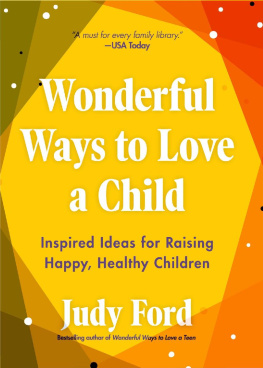
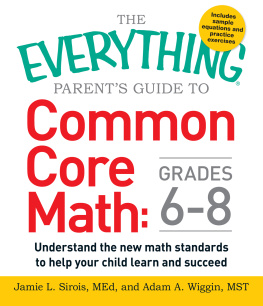
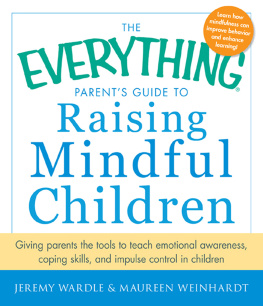
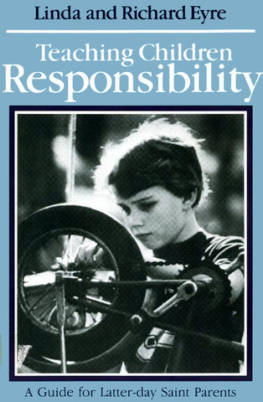

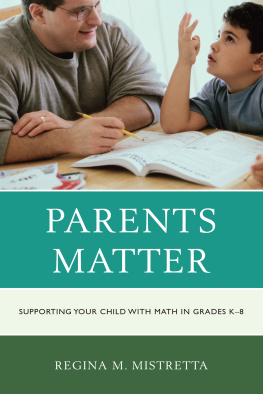
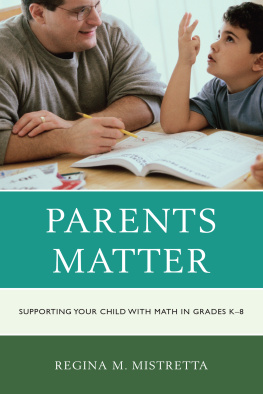

 are registered trademarks or trademarks of the Institute For Professional Development, Ltd. and may not be used without written permission expressly granted from the Institute For Professional Development, Ltd.
are registered trademarks or trademarks of the Institute For Professional Development, Ltd. and may not be used without written permission expressly granted from the Institute For Professional Development, Ltd. Published and printed in the United States of America
Published and printed in the United States of America